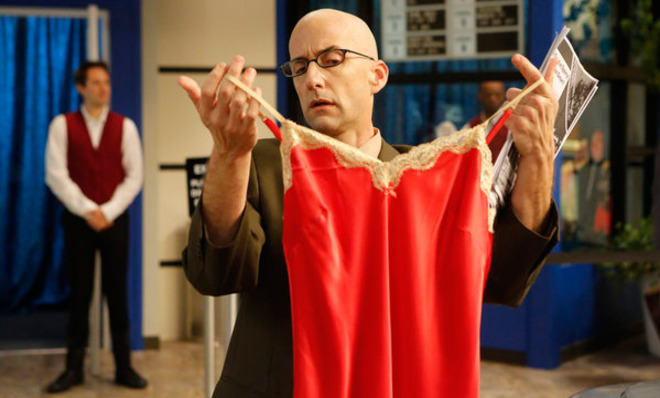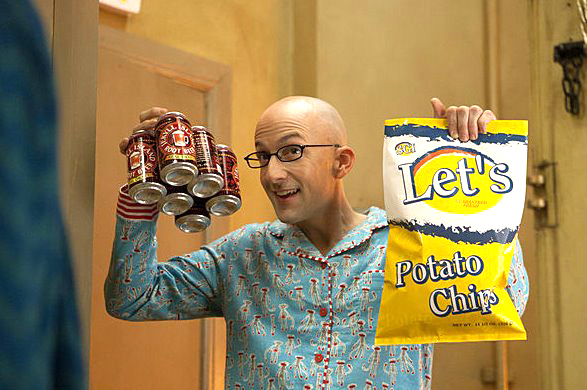How Community's Dean Pelton broke new ground for sexual politics on television
In five seasons, the Community character has undergone one of the most unique and fascinating arcs in recent sitcom history

A free daily email with the biggest news stories of the day – and the best features from TheWeek.com
You are now subscribed
Your newsletter sign-up was successful
Since 2009, NBC's sitcom Community has chronicled the lives of a wacky group of students and staff at Greendale Community College. From the very beginning, Community offered more diversity in race, gender, and age than your average network sitcom. What you might not remember is the first voice viewers hear in the show's pilot: Greendale Dean Craig Pelton (Jim Rash), whose ambiguous sexuality quickly became one of the show's running jokes.
In an early episode, Dean Pelton is satirized for a misguided attempt to be politically correct when he collaborates with Pierce Hawthorne (Chevy Chase) to create an amorphous "Human Being" mascot without discernable traits such as gender, ethnicity, voice, or eye and hair color. But in retrospect, there's a more resonant aspect to the "Human Being" mascot, who — much like Pelton — resists simplistic categorization.
Many viewers and critics have presumed that Dean Pelton is gay. Though his sexuality has never been overtly stated, Pelton's attraction to leading man Jeff Winger (Joel McHale) is evident: He touches Jeff's arms and stomach, invites him to watch Friends with Benefits ("no subtext"), blackmails him into a shopping date at the mall, and swoons over how he looks in aviator glasses.
The Week
Escape your echo chamber. Get the facts behind the news, plus analysis from multiple perspectives.

Sign up for The Week's Free Newsletters
From our morning news briefing to a weekly Good News Newsletter, get the best of The Week delivered directly to your inbox.
From our morning news briefing to a weekly Good News Newsletter, get the best of The Week delivered directly to your inbox.
But if you look past the most obvious reading, Community drops plenty of hints that the dean's identity isn't that simple. In an episode in the first season, Pelton makes an apparent Freudian slip while presiding over a mock trial. Noting that two other characters have conflicts of interest, the dean makes one of the series' first references to his ambiguous sexuality: "There are two biases, one on each side. And I go both ways… Let's strike that... I am impartial." Even more telling is the response he gives to a student who refers to the dean as a "fruit": "Unacceptable and none of your business and barely the whole truth."
Close observation reveals further nuances of Pelton's sexuality. For instance, Pelton's personal list of the campus' most attractive people includes Jeff (number two) and Michelle Slater (guest star Lauren Stamile, at number seven). When the two reveal that they're dating, Pelton uses the guise of paperwork to ask prying questions — and when he asks whether they would consider spending the night with a third party, he clearly has himself in mind.
What's the real story? Series creator Dan Harmon has called the dean "a celebration of the enigma," and maybe that enigma is just there for the fun of keeping people guessing — an innocuous running joke like Home Improvement concealing neighbor Wilson's face behind the picket fence, Frasier hiding Niles' wife Maris, or The Simpsons joking about what state Springfield is in.
There is, of course, a more cynical read: That Community treats Dean Pelton's sexuality as a mystery to avoid explicitly stating that the character is actually out. Film and television characters who are instead "coded" are sometimes leveraged for stereotype-driven or homophobic humor, and lingering cultural discomfort with same-sex romance and sexuality surely keeps many of these coded characters in the closet. Creators can allude to sexuality for jokes (and/or appeal to LGBT fans with subtext) without actually depicting a same-sex relationship. Given that there are so few depictions of bisexual characters in popular culture, this frustrating trope is invoked far too often.
A free daily email with the biggest news stories of the day – and the best features from TheWeek.com
But a full consideration of Dean Pelton reveals something sharper and more complicated than that. Yes, the humor surrounding his sexual tendencies sometimes draws on stereotypes. On occasion, he can even come off as predatory — a tired misconception about gay and bisexual men.

But in an average episode, Dean Pelton doesn't seem creepy; he comes off as friendly — though clingy — and loveable. What student wouldn't want a dean who puts together a can-can costume just to say biology class is "can-can-cancelled?" Or a dean who improvises a song to the tune of "Come On, Irene" about using hand sanitizer and stapling papers? He's eccentric — but no more so than anyone else at Greendale. The show's basic premise relies on a campus full of deeply flawed people who form an unlikely family and (yes) a community.
There's another, far more heartening way to interpret Dean Pelton's uncategorized sexuality: the dean himself isn't ready to define it. Jim Rash has said he doesn't know his own character's orientation; maybe Pelton, too, is still figuring it out.
It fits with his character's arc. When we first meet Dean Pelton, he's seen only in suits. Over time, he starts dressing in costumes, which then grow more frequent and more elaborate. At first, he feels the need to explain himself when he wears a woman's Uncle Sam costume — he says it's his sister's — but in later episodes he cheerfully wears dresses and other feminine outfits without feeling compelled to justify it. A flair for costumes is a different issue than orientation, of course — but the dean could be on a journey toward accepting both of those facets of himself. A real-life coming-out process takes time, and given Community's broader story trends, it makes sense that we're seeing the dean gradually grow more comfortable with his orientation — however he may ultimately define it.
Various hints suggest that the most accurate label for Dean Pelton's orientation would be bisexual — a term used for those with the capacity to be attracted to more than one gender identity. Bisexual people may also use words such as fluid, pansexual, or non-monosexual to describe themselves. Bisexual people are commonly treated as if their identity is befuddling. They're often assumed to be either gay/lesbian or straight, depending on the person they're dating — an assumption some viewers will likely make if Community ever introduces a squeeze of Dean Pelton's.
In last week's "Basic Story," Annie finds a wedding ring in the dean's office, and it briefly appears that the dean has been married throughout the entire series. A surprised Annie asks, "Who's the lucky…?" The sentence hangs because she doesn't know how to complete it. As it turns out, the dean isn't married; the ring was his mother's. But if the dean had answered the question, would Annie (and viewers) better comprehend the dean's orientation — or make assumptions about it? If he'd had a wife all along, would his flirtations with Jeff be written off as insignificant, even though his longstanding crush is obvious?
Instead of trying to peg Dean Pelton into a binary gay or straight identity, viewers should use the character to embrace a more nuanced understanding of sexuality. Real-life bisexual people aren't just marginalized in popular culture; they experience high rates of poverty, employment discrimination, and domestic violence. They are at an elevated risk for some health problems, including mental health issues. When a real-life community is ignored, erased, and denied its very existence, the presence of such a prominent and well-developed character is a step forward.
Stevie St. John is a freelance writer in Los Angeles. She edits the LGBTQ site Spectrum Los Angeles.
-
 The 8 best TV shows of the 1960s
The 8 best TV shows of the 1960sThe standout shows of this decade take viewers from outer space to the Wild West
-
 Microdramas are booming
Microdramas are boomingUnder the radar Scroll to watch a whole movie
-
 The Olympic timekeepers keeping the Games on track
The Olympic timekeepers keeping the Games on trackUnder the Radar Swiss watchmaking giant Omega has been at the finish line of every Olympic Games for nearly 100 years